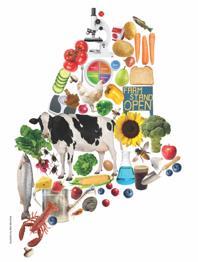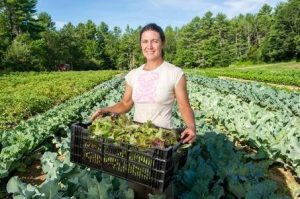2021-2022 Statewide Highlights
Maine Food System
Extension Shares PFAS Resources for Farmers
Relevance: Low levels of PFOS, PFOA, and other PFAS are present in our environment. Higher levels are sometimes found near airfields that may have used fire-fighting foams, factories that used these chemicals, or land with a history of using certain waste materials or biosolids containing PFOS, PFOA, or other PFAS. Crops may be grown on soil that has these PFAS, but how much of these chemicals are in the crop depends on the type of crop, what part of the crop is edible, soil properties, and levels in the soil. These chemicals may end up in the milk and meat of animals fed crops like hay containing PFAS. These chemicals can also move from the soil into the groundwater and into well water. Consuming contaminated milk, meat, plants, or water are potential ways people can be exposed to these chemicals. The state of Maine has allocated significant funding for dealing with issues related to PFAS and is dedicated to supporting the landowners who are affected by land application of wastewater sludge and septage, AFFF, Department of Defense sites, landfills or other PFAS sources.
Response: UMaine Extension has made a dynamic set of resources about on-farm PFAS contamination available online to the public in one location: “Guide to Investigating PFAS Risk on Your Farm” is a comprehensive collection of resources about contamination from Per- and Polyfluoroalkyl Substances in Maine. Topics include Maine’s response to contamination at agricultural sites, steps to determining risks and mitigation options for farms, and information on the sources of PFAS contamination. The new website will be updated as the research and resulting information evolves. The resources are from multiple Maine state agencies, including the Departments of Agriculture, Conservation and Forestry, Health and Human Services, Environmental Protection, and Maine CDC. Supporting organizations contributing information include UMaine Extension, Maine Farmland Trust, and Maine Organic Farmers and Gardeners Association.
So, You Want to Farm in Maine?
Relevance: Current farmers thinking about changing farm enterprises and new farmers interested in starting a farm may lack the skill, knowledge, and confidence to investigate their options to start, adapt, and maintain a profitable land-based business. Major issues farmers and potential farmers (whether full-time or part-time) need to overcome include access to capital, understanding of rules and regulations affecting agriculture operations, and marketing options.
Response: UMaine Extension created the So, You Want to Farm in Maine short course in 2015. Traditionally offered in person, this is the third year it is available online only. It is designed to introduce farm business management topics to those who are starting farms in Maine. The 2022 session was a bit different as participants include 44 aspiring farmers as well as 13 UMaine undergraduates, providing the opportunity for richer discussions and connections between those interested in starting Maine farms imminently, as well as students with a variety of backgrounds and experience. The undergraduates were teamed with aspiring farmers to create draft business plans over the course of five weeks. Farmers had the opportunity to receive USDA Farm Service Agency borrower training credit, and undergraduates receive one credit.
person, this is the third year it is available online only. It is designed to introduce farm business management topics to those who are starting farms in Maine. The 2022 session was a bit different as participants include 44 aspiring farmers as well as 13 UMaine undergraduates, providing the opportunity for richer discussions and connections between those interested in starting Maine farms imminently, as well as students with a variety of backgrounds and experience. The undergraduates were teamed with aspiring farmers to create draft business plans over the course of five weeks. Farmers had the opportunity to receive USDA Farm Service Agency borrower training credit, and undergraduates receive one credit.
Since 2015, 292 people have participated through face-to-face, video-linked, webinars, live-streamed, Zoom, and archived sessions to learn about agriculture enterprise selection, business planning, record keeping, market research, regulations, and resource identification.
Results: Knowledge change was assessed by a post-program evaluation. Participants responding to a program evaluation reported having moderate to considerable knowledge and understanding of farm business management plan development because of the program. In 2022, 44% of participants received FSA Borrower Training Certification. In 3-months after the program, FSA has awarded over $40,600 in loans with more preparing their loan applications. In previous years the Farm Service Agency provided $2.7 million in farm direct loans because Maine farmers attended this approved borrower training program.
Home Horticulture
Relevance: Every day, Maine gardeners are deciding on whether and how to manage pests, what fertilizers to use and how much, what plants to grow, methods to cultivate the soil, and how to utilize water resources to maintain landscapes. Nearly every residential site has a landscape that requires maintenance and decisions made in these sites can have a significant impact on our natural resources. Home gardener success also results in improved food security and has an economic role in our green industry.
Response: In 2021, home horticulture programming directly reached 12,256 adults and 896 youth through over 120 hours of educational programs, both in-person and virtual. This included over 5,223 questions, received via email, phone calls, and walk-ins that were answered for home gardeners. An additional 14,579 home gardeners were reached indirectly through garden-related videos, newsletters, newspaper columns, and publications from Extension.
Results: As a result of Extension programs, participants reported developing new or expanding existing gardens; increasing their consumption of home-grown food; adopting sustainable gardening practices involving soil quality, improving efficiency, and adopting IPM strategies; and using Extension to identify pest problems and to determine research-based management strategies.
4-H Positive Youth Development
Northeast Collaborative 4-H AFRI Project
Relevance: In 2021, schools were challenged to deliver both in-person and remote learning experiences to students.
Response: A collaboration of Extension 4-H programs from Vermont, Maine, and New Hampshire received a USDA Agriculture and Food Research Initiative (AFRI) grant to support school enrichment for rural, remote learners. The tri-state Extension Collaborative developed an AgriSTEM curriculum designed to be delivered by 4-H professionals virtually. Local 4-H Centers distributed curriculum kits containing a computer tablet equipped with various synchronous and asynchronous learning tools. The tablets were used to bridge the home learning environment and traditional classroom by encouraging collaborative learning and acting as a means of documenting learning. Curriculum kits also included hands-on materials for each lesson. Each student received their own set of materials to use in the classroom and/or at home and to keep as their own.
Results: In 2021, 594 students participated in the AFRI program across the 3 states. We also delivered programs to campers at local 4-H centers. Classroom teachers reported that students used their tablets as a way to document, enhance, and evaluate their learning during each lesson. Students were able to access lesson materials individually while simultaneously learning in a group setting. This achieved the dual benefits of hands-on learning and social interaction, whether in person or virtually. By performing experiments, gathering data, reviewing content, and reflecting on their learning together, students gained a deeper understanding of AgriSTEM concepts.
Extension Micro-credentialing through UMaine System
Relevance: Research shows that 86% of hiring managers indicate that it is “very important” that recent graduates demonstrate the ability to apply knowledge and skills in real-world settings and only 39% think recent graduates are well-prepared to apply skills in real-world settings. The UMaine System is developing micro-credentials for earners to show their skills. Micro-credentials help earners make competencies visible, beyond what is seen on a transcript or resume; demonstrate skills in real-world settings; gain work experience and receive valuable performance feedback; differentiate and stand out to employers; better articulate the skills developed to potential employers; enhances digital identity; share badges and be recognized. All micro-credentials/badges can be shared on social media and professional sites, such as LinkedIn as well as on your website, e-portfolio or resume.
Response: Aware that UMaine Extension provides valuable skills to both youth and adult learners, we began developing and issuing micro-credentials through the UMaine System. Credentials were created to show skills acquired through the food safety, aquaculture, and 4-H Stem Ambassador programs. Earners ranged from current UMaine System students to general public adults. These credentials can be used to showcase skills earned through the University of Maine Cooperative Extension, and are verified by the University of Maine System.
Results: Extension-generated micro-credentials issued in 2021 included Food Safety, Aquaculture, and 4-H STEM Ambassadors, and 4-H Outdoor Leadership. There is interest from additional Extension faculty, staff, and partners, and future possible Extension micro-credentials include meat cutting; youth aquaculture; Master Gardeners Facilitation; 4-H Volunteers; and Boots2Bushels.
Sustainable Community and Economic Development
Master Gardener Volunteers 
Relevance: Successful school and community gardens are an important tool for enhancing public health and providing meaningful community engagement opportunities by increasing access to locally grown food, providing a safe space to connect with neighbors, and offering learning opportunities outside the classroom. Extension supports volunteer leaders and provides educational resources, which are key contributors to the success of these projects.
In 2020, due to the pandemic, gardening and gardening questions increased as much as 70% from last year in some counties. Now more than ever Maine residents need access to reliable research-based information to become successful gardeners.
Response: In 2020, Master Gardener Volunteers (MGV) played a vital role in connecting communities with educational resources through one-on-one mentoring, social media, and virtual programming. The MGV program provides participants with a minimum of 40 hours of in-depth training in horticulture. Trainees receive current, research-based information from our educators and industry experts and are connected with service projects that match their interests, skill set, and availability. MGV coordinators facilitate relationships between MGV and community partners, assisting with needs assessment, program planning, risk management, and problem-solving.
Results: The MGV program provides opportunities for gardeners with all levels of experience to connect with meaningful service projects in their communities. Of the 932 active MGVs, 113 were trained in 2020. In total, they donated 7,600 hours to a variety of food security projects and virtual volunteer opportunities. MGVs reported that they:
- increased consumption of home-grown food
- adopted techniques to improve soil quality
- developed new or expanded gardens
- implemented practices that improve efficiency and reduce inputs and negative impacts
- engaged positively with their communities.
Many volunteers enter the MGV program with the goal of improving their gardening skills for their own personal benefit and leave surprised by how deeply involved and passionate they become about community projects.
Mainely Dish Social Media Outreach
Relevance: COVID-19 impacted people’s lives in a variety of ways, including the increased need for easily accessible information about how to cook affordable and nutritious foods at home. EFNEP’s social media platform became key to reaching Maine’s low-income adults, youth, and young adults to share research-based food and nutrition information to meet their needs. By learning more about diet quality, physical activity, food safety, and food resource management the consumers will be able to learn and apply this knowledge to their everyday life.
Response: To increase EFNEP’s virtual presence and reach more Maine people, EFNEP’s social media platforms were expanded beyond Facebook to include Instagram and TikTok. In response to COVID-19, the development of short recipe videos, “Mainely Dish” began. Mainely Dish videos are used by multiple program areas, including 4-H, Food Preservation, Home Horticulture, and EFNEP. By using inviting graphics, timely educational content, and Mainely Dish videos, social media reach has grown and EFNEP, social media, and online presence have become prominent in Extension and throughout the state.
Results: In 2021, UMaine Extension’s EFNEP Facebook page increased likes by 90 people for a total of 547-page likes. UMaine Extension’s EFNEP’s Instagram increased followers by 96 people for a total of 191 followers. We created 51 new videos for Extension’s EFNEP Mainely Dish recipe videos for a total of 87 videos created since March 2020.
